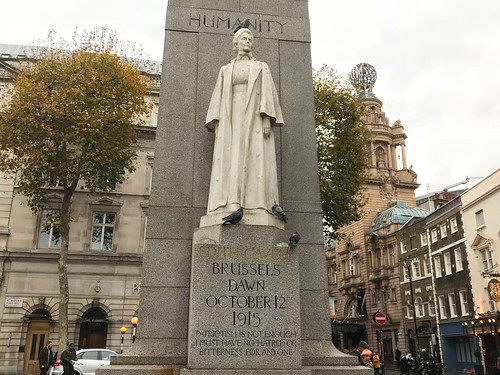
Many years ago, my family took a trip up to the Canadian Rockies. On a somewhat rainy morning, we drove up the Icefields Parkway to an area below Mount Edith Cavell. Along the way, we saw a mother grizzly bear and her two cubs, which probably made the area a little more memorable to this then-tween.

But the signs up at the top of the road, near a beautiful lake and below the stately mountain, told of the story of the real Edith Cavell. A nurse during WWI, Edith was sent to Belgium to care for the wounded Allied soldiers. She refused to discriminate between Allied and German soldiers, caring for whoever needed it. There was no question to her loyalties, however: she aided at least 200 Allied soldiers escape from German-occupied Belgium.

Edith was a proficient communicator and an avid letter-writer. So it was not only her family, but all of Great Britain, who knew the news when she was arrested by the Germans and (despite international pressure) executed for her work with the resistance. But the thing that I remember best is her famous quote, supposedly written in a letter to her family the night before her death:
“Patriotism is not enough. I must have no hatred or bitterness toward anyone.”
That, coming from a woman who had helped both sides but was being executed by one of them! She had not discriminated against the enemy, but they had still condemned her. It shows the depth of her belief in forgiveness and that she probably struggled with the injustice of the situation.

When I look at the pictures of Mount Edith Cavell (these photos are not mine, by the way) it seems so solid and enduring. I see it as an excellent tribute to a woman who stayed firm in her forgiveness despite the circumstances; someone who spread the message around the world that patriotism should never become hatred.

It’s tempting at times to take a side on an issue or topic – even take a side that you’re a Christian and others are not. There’s nothing wrong with being firm in your beliefs per se. I’d even say that it’s better to know what you believe than to waffle around on the topics that matter. But it’s easy to become so wound up in your side of the issue that everyone else becomes the enemy. Hatred grows until the other side is “confused” at best and (your version of) “demonized” or “a #@!%” at worst. It’s just another form of patriotism – and patriotism is never enough. If there is hatred at the heart, than we’re no better than the other side who we believe hate us for our truth.

We can make the choice to help the wounded on both sides, while never losing the loyalty and beliefs in our “side” of the issue. Or we can make the choice to hate the people who don’t agree with us. It’s really up to us to make the right decision.






